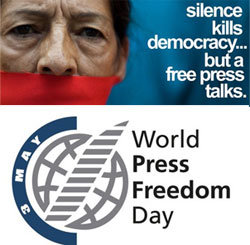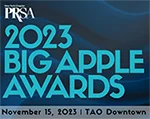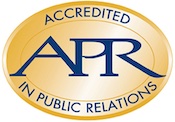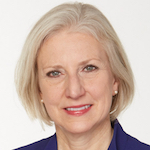Three PR Ph.D's are assessing PRSA's awards program. But they also need to consider what is meant by "PR" these days --just what are the "outcomes" and goals that are being sought.
 Maureen Schriner, Univ. of Wisconsin-Eau Claire; Rebecca Swenson, Univ. of Minnesota-Twin Cities, and Nathan Gilkerson, Marquette Univ. Maureen Schriner, Univ. of Wisconsin-Eau Claire; Rebecca Swenson, Univ. of Minnesota-Twin Cities, and Nathan Gilkerson, Marquette Univ. |
The researchers are Maureen Schriner, University of Wisconsin-Eau Claire; Rebecca Swenson, University of Minnesota-Twin Cities, and Nathan Gilkerson, Marquette University. Schriner and Gilkerson are members of the Society.
They are limiting their research, so far, to the Society's Silver Anvil program, hailing it as the "Oscars" of PR, when there are other major awards programs in PR, some of them bigger in terms of entries and influence than the Society's program.
PR Week/U.S., held its awards banquet March 19 in New York, attracting more than 500 to a sold-out sit-down dinner. There were 236 "finalists" in dozens of categories. PR News has an extensive awards program as does The Holmes Report which conducts Sabre awards programs in the Americas, Asia-Pacific, Europe/Middle East, North America and Southeast Asia.
Quite often we find that the PR department, if there is one, is involved in blocking the flow of information and blocking access to executives and others involved in a news story.
If such an activity can be considered a desirable outcome, then we nominate the Society's own "PR" for a Silver Anvil. One of its goals for many years has been to block O'Dwyer coverage of it as much as possible and block members from knowing about this.
No Society officer has talked to O'Dwyer reporters since 2005. It won't let us exhibit our six products at its national conferences and won't let any O'Dwyer staffers join although hundreds of other writers and reporters are members.
This reporter has been blocked from all sessions at national conferences since 2009 and we expect a repeat of that policy at the conference in Atlanta Nov. 8-10.
We went to the national conference in San Francisco in 2013 after VP-PR Arthur Yann said the Society had no boycott against any reporters. However, guards escorted us out of the hotel lobby on the first day with orders to stand across the street. Access to all activities was barred.
"Beat You To a Pulp"
An Assembly delegate in 2010 threatened to beat us "to a pulp" while Society leaders watched from behind a hotel window. No investigation or interest in this was shown by the leaders. The assault was reported to D.C. Police. An entire day of Assembly notes was stolen from our conference bag in 2003. Leaders then refused to provide a tape of the Assembly.
The Society withholds its audit from us each year and we have to wait until almost Nov. 15 when its 990 tax return is finally due. Our only recourse to such illegal and unethical tactics is an expensive lawsuit that would drag through the courts for years. A dozen authors in 1994 caught the Society red-handed selling copies of their articles. But no law firm would take the case because of the cost and years that would be involved.
The above are minor irritations compared to the legal assault made on the O'Dwyer Co. in 1994 by TJFR Publishing, the Society, and the New York Times. A $21 million lawsuit charged us with false and malicious coverage of a speech by Dean Rotbart to the 1993 Society conference.
All charges were dismissed by a New York Federal Court after more than a year of voluminous pre-trial arguments. The Society withheld a videotape of the speech and NYT, after reporting on our coverage of the speech, printed not a word of our legal victory.
Testimony to the success of PRS blocking members from knowing about such behavior is that Prof. Schriner said she had no knowledge of the "blacklisting" of the O'Dwyer Co.
PR Trades, General Press Get Same Treatment
The "outcomes" sought by the PR Society vs. the O'Dwyer Co. are similar to what other PR trade press and reporters worldwide are experiencing.
PR Watch, headed by Lisa Graves, finds its reporters are booted from the hotel when they try to cover the American Legislative Exchange Council.
Gregory Kohs, a paid contributor to Wikipedia and the main critic of it, was barred from its 2014 conference in New York.
Dave Murray, reporter covering the Int'l Assn. of Business Communicators for many years, in 2013 was likened to a dog "humping in the park" by chair Robin McCasland because of his criticisms. He said he was giving up trying to reach IABC staff or leaders because they ignore his calls and emails. He skipped the 2014 national conference in Toronto.
We get the same silent treatment from IABC even though we're dues-paying members ($327 annually for national and mandatory chapter dues).
Media Attacks a Worldwide Phenomenon
The resistance U.S. trade reporters experience cannot, of course, hold a candle to the beheadings, jailings, accusations of treason, blown up offices, deportations, etc., that are being visited upon reporters in other countries.
It's such a worldwide phenomenon that the UNESCO has a 51-page report on the subject. Nearly 400 journalists have been murdered since 2006 (not counting those killed in battle). The murderers are almost never caught nor even sought after, says UNESCO's Navi Pillay.
 Press freedom is under unprecedented worldwide assault, said Al-Jazeera's Peter Greste upon being released in February from an Egyptian prison after 400 days. The "war on terror" is being used as an excuse for the crackdown on the press, he said, noting that two-thirds of 220 journalists in prison are there on charges of terror or subversion.
Press freedom is under unprecedented worldwide assault, said Al-Jazeera's Peter Greste upon being released in February from an Egyptian prison after 400 days. The "war on terror" is being used as an excuse for the crackdown on the press, he said, noting that two-thirds of 220 journalists in prison are there on charges of terror or subversion.
He was convicted of aiding the Muslim Brotherhood and spreading "false news" about civil war in Egypt.
Not a Peep from the PR Society
May 3 is "World Press Freedom Day" but it will not be noted on the PR Society website or by any of its leaders.
Given the Society's decades of battling the O'Dwyer Co., it would be hypocritical of it to express sympathy for victims of press persecution.
We have put three requests to 2015 chair Kathy Barbour, who joined Acosta Sales and Marketing in Jacksonville as VP-CC this month after 2.5 years with Baptist Health South Florida; new CEO Joseph Truncale, and VP-PR Stephanie Cegielski.
They are that we be allowed to join the Society, that the O'Dwyer Co. be allowed to exhibit at the conference in Atlanta Nov. 8-10, and that a Society committee study the illegal copying and sales of authors' articles that took place from 1978-94. There has been no response so far.
Definition of PR Needed by Profs
The three PR profs who are researching the value of the Society's awards program first have to come up with a definition of what PR should be.
 Barbour Barbour |
Quite often, impeding press coverage is one of the goals of the PR department, if there is such a department at the corporation or institution involved.
Since the Society champions "the free flow of information," campaigns have to be judged in that light. In a democracy, the truth about something often only comes out after vigorous public debate and discussion.
Campaigns should be judged on how many press conferences are held; how many executives give interviews; how free is the company or institution in revealing important documents; whether there is a PR person who calls on the press rather than waiting for the press to call, and whether rank-and-file employees and suppliers are able to comment about the company without suffering retaliation.
PR used to be much more of a bridge between institutions and media. That is a subject that professors Schriner, Swenson and Gilkerson should explore.


 PRSA-NY today announced its five honorary co-chairs for its Big Apple Awards ceremony gala slated for TAO Downtown on Nov. 15.
PRSA-NY today announced its five honorary co-chairs for its Big Apple Awards ceremony gala slated for TAO Downtown on Nov. 15. PRSA-NY president Carmella Glover today issued a "heartfelt apology" on behalf of the chapter for her Oct. 14 message that "caused disappointment and hurt to some of our valued members."
PRSA-NY president Carmella Glover today issued a "heartfelt apology" on behalf of the chapter for her Oct. 14 message that "caused disappointment and hurt to some of our valued members." The leadership of Public Relations Society of America is backing a move to change the current “must-have” APR accreditation to “strongly preferred” as a requirement for a seat on its board of directors.
The leadership of Public Relations Society of America is backing a move to change the current “must-have” APR accreditation to “strongly preferred” as a requirement for a seat on its board of directors. Public Relations Society of American today named Linda Thomas Brooks CEO, succeeding CFO Phil Bonaventura, interim chief since July 2019.
Public Relations Society of American today named Linda Thomas Brooks CEO, succeeding CFO Phil Bonaventura, interim chief since July 2019.


 Have a comment? Send it to
Have a comment? Send it to 
No comments have been submitted for this story yet.